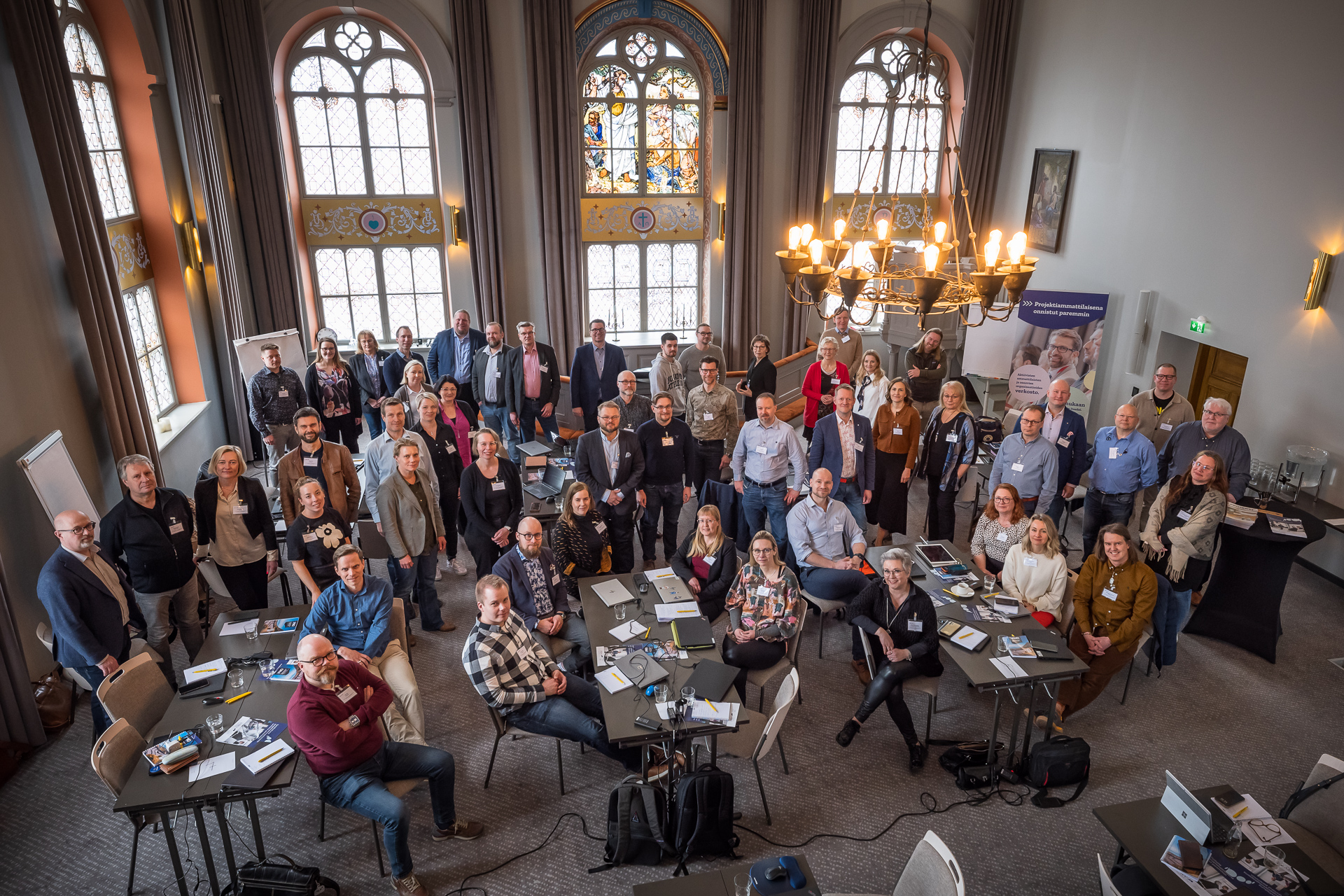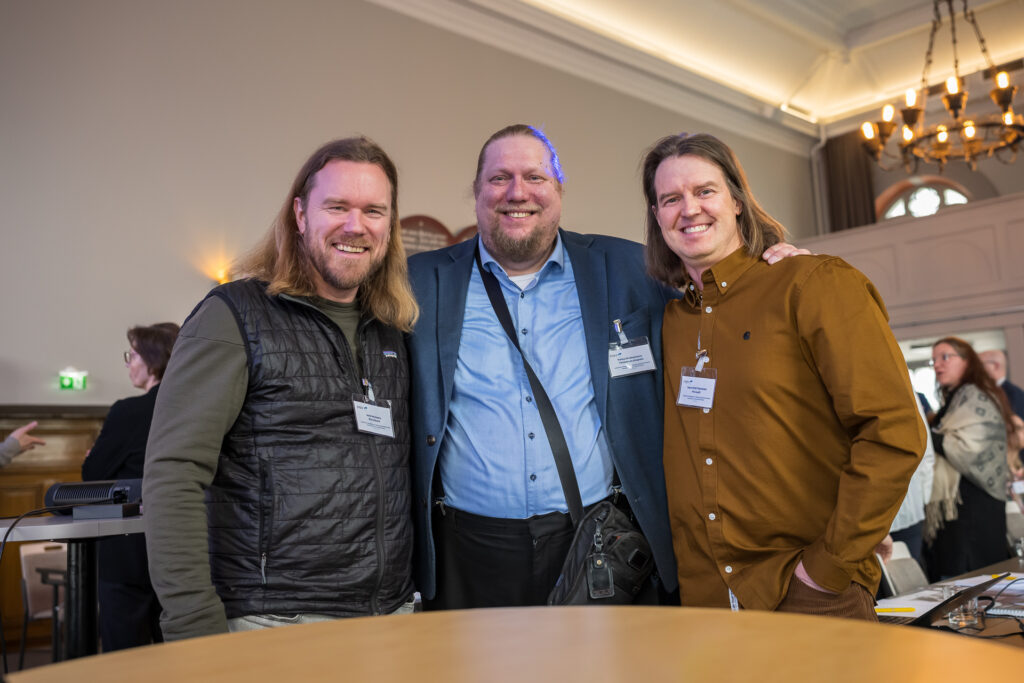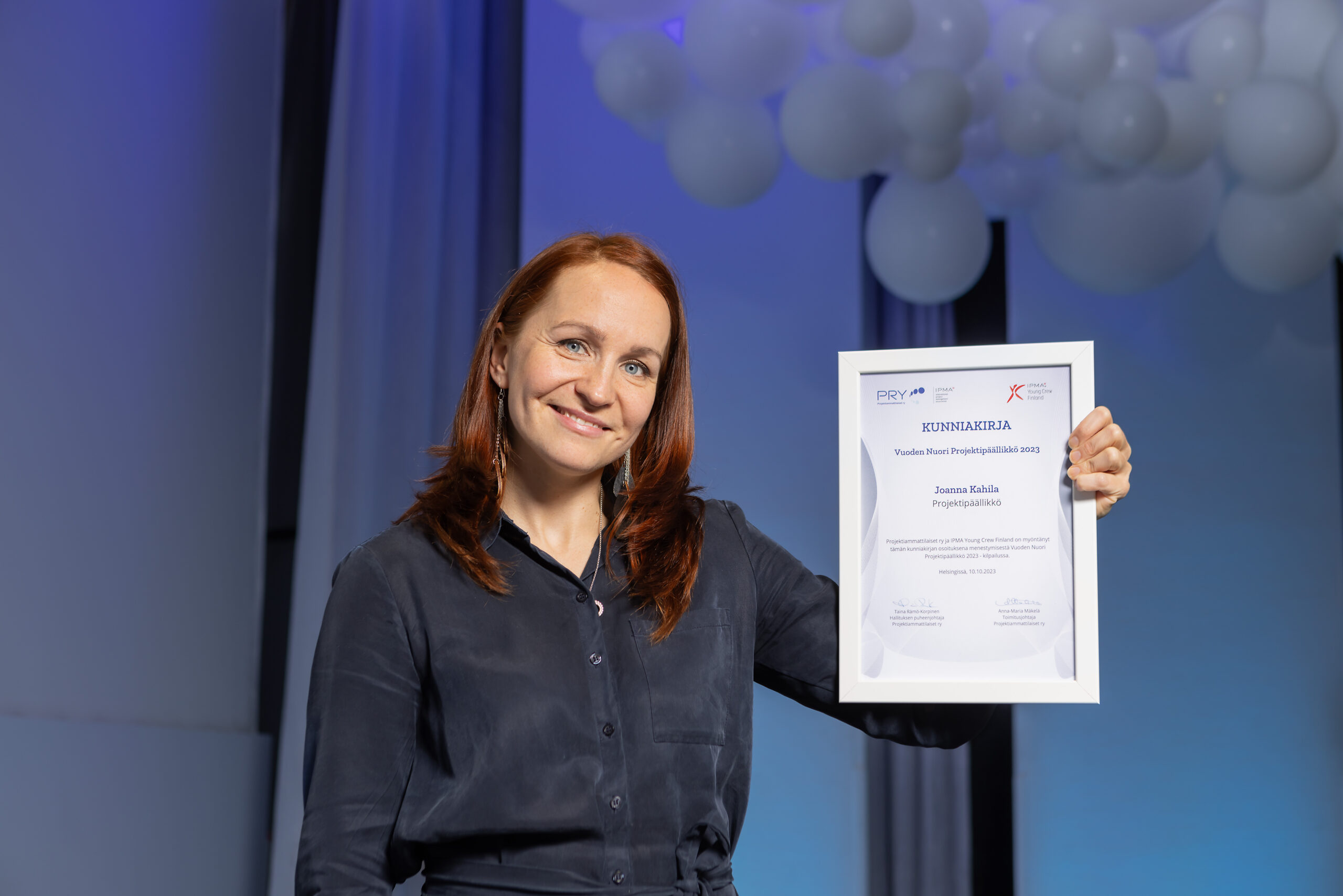More than 50 project management experts gathered in May at Kakola in Turku to discuss AI at the “AI @ Project Management” workshop. The event provided a comprehensive overview of the current state and future of AI, including interactive sessions and hands-on exercises. Participants were introduced to the benefits, challenges and opportunities of AI, creating an inspiring and educational experience.
Text by Sari Hildén

Current state of AI, potential threats and challenges
Professor Pekka Abrahamsson from the University of Tampere presented the current state of AI and its potential to improve productivity. AI enables predictive decision-making and innovation, and offers solutions to global problems such as climate change. The ethical use of AI is key to building a sustainable future.

AI is already seamlessly integrated into our daily lives, facilitating routine tasks and fostering creativity. For example, personal assistants such as Siri and Google Assistant make it easier to manage schedules and find information. Recommendation systems like Netflix and Spotify tailor our entertainment offerings to our personal preferences. Smart traffic lights and route planning help reduce congestion, while email filtering systems keep spam at bay and highlight important messages.
The rapid development of artificial intelligence has caused concern among many. Job losses are a major concern, as AI is able to perform an increasing number of tasks. It is therefore vital to develop your skills and keep up to date with the demands of the world of work. Another major concern is the ethical use of AI. It is essential to ensure that AI is used responsibly and fairly, avoiding discrimination and harm to people.
The third threat is dystopian scenarios where AI takes over and destroys humanity. Although AI has the ability to learn and evolve, Professor Abrahamsson compared the risk it poses to a runaway toaster.
He illustrated that while AI can learn and evolve, it is not a threat in its own right and cannot operate without human guidance or deliberate misuse. Humans must maintain an active role in the governance and control of AI so that its use contributes to the well-being and development of society.
AI research data and results from the PRY AI survey
Tuomo Koskenvaara presented the results of a survey of project professionals carried out at the turn of the year. The survey shows that the vast majority of project professionals, over 90%, use AI only occasionally. However, of the 10% who already use AI on a regular basis, more than 80% have experienced clear benefits from using AI.
Only 10% of respondents had received guided AI training and less than 15% of organisations have an AI strategy in place.
The IPMA’s ICB and AI model provides a broad framework for project, programme and portfolio management competencies, including the application of AI to these areas. This will enable project professionals to develop and use AI effectively in their work.
ISO/IEC 42001 – Artificial Intelligence Management system, a standard that provides requirements and guidance for organisations on the management and deployment of artificial intelligence, is also an ISO standard. SFS-EN ISO/IEC 22989-2023 provides guidance on the interpretation and use of the standard.
Ethical issues and technical limitations of AI
As AI becomes more intelligent and versatile, its ethical issues and technical limitations are becoming increasingly important topics of debate. Ethically, AI raises questions of responsibility, privacy and transparency in decision-making. Who is responsible when AI makes a mistake? How can we ensure that AI does not violate individual privacy?
Technical limitations, on the other hand, relate to AI’s ability to understand and interpret complex human emotions and social cues. In addition, AI learning and decision-making are based on available data, which can be biased or incomplete, leading to inaccurate or unfair results. These challenges call for continued research and development, as well as the establishment of ethical principles in the design and use of AI.
The rapidly growing use of artificial intelligence also brings with it significant environmental challenges, for example in terms of electricity consumption. Processing large amounts of data and using complex algorithms is necessary, but they require a lot of computing power, which in turn consumes a lot of electricity. This is particularly noticeable in data centres running cloud services and AI applications. Increased electricity consumption can lead to higher carbon emissions if energy is generated from fossil fuels.
When used on a large scale, AI systems can account for a significant share of global energy consumption. This puts pressure on finding more sustainable energy solutions, such as renewable energy sources. It is also important to develop more energy-efficient algorithms and optimise the architecture of AI systems to reduce their environmental impact.
It is good to take these challenges into account and to consider how and to what extent to use AI. Experimentation is very important for learning, but it is worth bearing in mind the environmental impact.
The future potential of artificial intelligence
Antonio Nieto-Rodrigues spoke about the expected revolutions in project management that will speed up project implementation and improve project success. With AI, project managers will have to adapt to new technologies, develop soft skills, leadership, strategic thinking and business insight. In the future, there will be a greater focus on delivering value to customers and meeting stakeholder objectives, while mastering new technologies to succeed.
How to jump on the winner’s bandwagon

Technology Director Vesa-Matti Paananen and management consultant Antti Merilehto discussed the use of artificial intelligence in business.
AI can be used for a wide range of tasks such as writing, translating, coding, testing, content creation, teaching and customer service. It is important to keep in mind that AI is a powerful tool, but its knowledge base is limited and it can sometimes produce erroneous results due to incomplete information. It is also important to follow ethical guidelines when using AI to ensure that it is used responsibly and correctly.
A project professional should take the first step towards using AI by simply starting an experiment. Open an AI tool such as Copilot or Gemini and start a dialogue. Identify the challenges you face in your work, team or organisation and ask your AI advisor for help. Describe your problem clearly and evaluate the answers you get. Be ready to ask for clarifications and challenge the tool until you get satisfactory answers. Remember, you can always try different tools to find the one that best serves your needs.
Companies should start by creating an AI strategy, which can start with identifying critical areas of activity, analysing production processes and assessing business benefits. Continuous evaluation and integration of AI assistants into processes such as customer service are key to improving competitive advantage and customer experience.
The development of artificial intelligence is very fast. By the time this article is published, progress has certainly been made, and some of what is now being learned is outdated. The important thing is to keep track of developments and try new innovations.
Projektiammattilaiset ry will again organise an opportunity to update your AI knowledge on 24-25.10.2024 in Kakola, Turku. The theme of the autumn workshop is “Ai² @Project Management | Taking AI from Design to Practice”. In addition, a number of webinars on AI etc. are planned. Welcome to join us!


